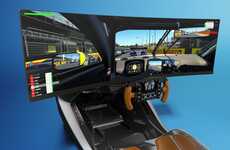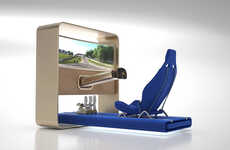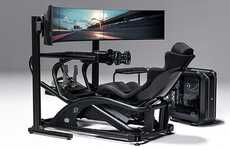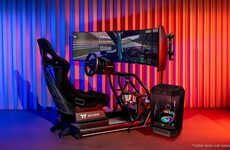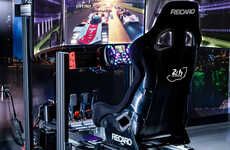
Brabham Automotive Created Three Simulation Rigs for its Models
Colin Smith — March 4, 2022 — Autos
References: brabhamautomotive & autoblog
'Brabham Automotive,' the Australian automaker famous for its track-racing supercars, has announced the creation of three Brabham F1 racing simulation rigs. These rigs are each tied to one specific, iconic car from Brabham Automotive's F1 racing history. The three selected vehicles are the '1966 BT19,' the '1978 BT46B,' and the '1983 BT52.' The simulation rigs themselves are designed to physically replicate the driver's seat section of the cabin complete with a screen that mimics the windshield of the car.
The software running on these simulators allows the user to simulate the experience of racing with these iconic, historical supercars. These three cars were not selected at random for the simulation rigs, though. Instead, each of these vehicles are tied to a landmark part of Brabham Automotive's history, such as a victory at a championship series or a debut racecar for an iconic professional racer.
Image Credit: Brabham Automotive
The software running on these simulators allows the user to simulate the experience of racing with these iconic, historical supercars. These three cars were not selected at random for the simulation rigs, though. Instead, each of these vehicles are tied to a landmark part of Brabham Automotive's history, such as a victory at a championship series or a debut racecar for an iconic professional racer.
Image Credit: Brabham Automotive
Trend Themes
1. Retro Racing Simulators - The rise in popularity of retro racing simulators presents an opportunity for companies to create innovative and immersive experiences for car enthusiasts.
2. Replica Racing Seats - The demand for replica racing seats for simulators open up opportunities for companies to create customizable and affordable options for individuals looking to enhance their racing experience.
3. Historical Car Racing - The integration of historical racing cars into simulators can provide a unique experience for individuals interested in classic car racing.
Industry Implications
1. Automotive - Automotive manufacturers can create partnerships with simulators to promote brand awareness and increase interest in their products.
2. Gaming - The gaming industry can continue to create high quality racing simulators with innovative features to attract consumers.
3. Entertainment - Theme parks or racing experience centers can cater to car enthusiasts by providing realistic and immersive racing simulations using replica racing seats and historical cars.
3.8
Score
Popularity
Activity
Freshness

